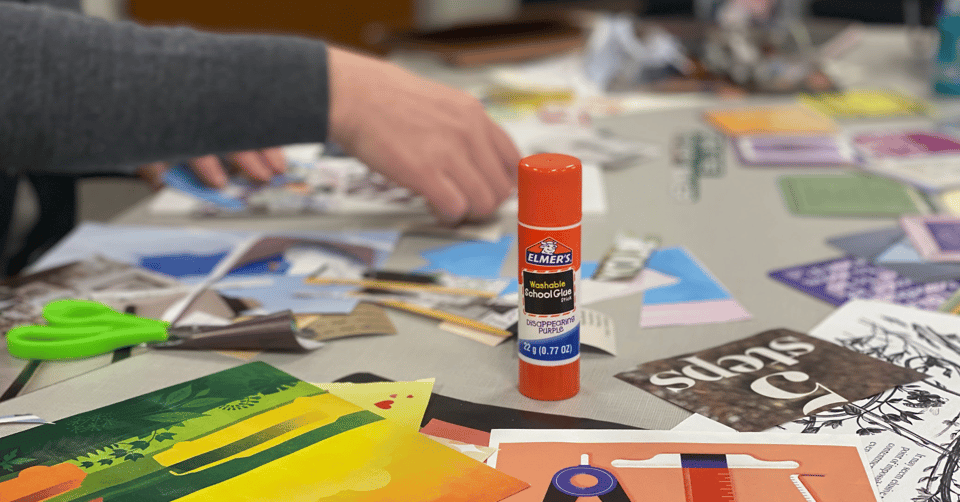I'd Love To Change The World (But I Don't Know What To Do)
Exploring the skills we need for the future, why self-awareness is a leadership advantage, and the power of making space—for thinking, for creativity, and for what truly matters.
In this edition:
- Self Awareness as Your Competitive Advantage
- The Power of Creating Together
- Your Brain is an Asset - Treat It Like One
- An Experiment in Rest - Massage at The Getaway
It’s 2025, and let’s be honest—our society, economy, and industries are in a mess of our own making. The turbulence isn’t new, but the scale of what’s shifting feels different. I keep coming back to this: what got us here won’t get us where we need to go.
I believe we need new muscles—creativity, intuition, deep thinking. The ability to see what's next before it arrives and make sense of the chaos. My work is shaped around that: helping people build the skills and solutions that will define the future.
Let’s Summerize is about changing the world through the corporations that shape our daily life. The Getaway is about changing the world through the communities and moms raising the next generation. Both exist to create something better.
The song says, "I’d love to change the world (but I don’t know what to do)"—but that’s not quite true. I have a hypothesis: I think we need more creative thinking, intuition, holding space, visioning, working together, and letting go of the nonsense that keeps us stuck.
Self-Awareness is the New Competitive Advantage
Self-awareness gets talked about a lot, but ask ten people what it actually means, and you’ll get ten different answers. Brené Brown talks about how a lack of self-awareness causes us to lead from a place of fear, resentment, or reactivity—often without realizing it.
Some equate it with self-reflection. Others mistake it for self-critique. But true self-awareness isn’t about thinking more about yourself—it’s about knowing yourself in a way that shapes how you move through the world.

For me, self awareness – especially in a leadership capacity – means knowing what you bring to the table and what you need to do your best work. It means recognizing how your emotions and decisions impact others. It’s having a clear-eyed view of your own patterns—how you react under stress, when you default to autopilot, and where your blind spots are.
What does self-awareness mean to you? And what role does it play in your leadership? Please reply and let me know. I love getting replies to these notes and hearing what comes up for you.
Leadership Tactic: “Say it out loud”
If you want to lead with more self-awareness this week, try this:
Reflection: Pay attention: What’s one moment of frustration, stress, or resistance that keeps showing up for you?
Action: Next time you feel it, name it—out loud.
- Instead of snapping at a teammate, try:
“I’m realizing I get impatient when decisions stall. Let’s figure out how to move forward.” - Instead of avoiding a tough conversation, try:
“I know I need to give feedback, but I tend to put it off. Let’s talk about this now.”
Why this works: Self-aware leaders need to recognize patterns in real time and make adjustments in the moment.
Hands Busy, Mind Wandering—The Power of Creating Together
Last month’s workshops were a fresh reminder that people crave spaces where they can commune and create together. Not alone, not in silence, but side by side, doing something with their hands while their minds wander. Light conversation, a mix of focus and flow and a break from being on all the time.

I saw it in scrapbooking workshops. I see it in coworking hours, seasonal resets, and art classes. And I saw it again in last month’s Vision Board Workshop. Moms don’t just need time for themselves—they need time in the company of others, doing something that feels both personal and shared.
At the workshop, the images people chose weren’t random. They carried meaning, symbolism and other things words couldn’t quite capture. I’ve always believed visuals hold power, but watching people find their images, the ones that clicked, reinforced it in a whole new way.
In the Inner Compass Values Workshop, I observed participants that appreciated the moment of reflection in their day. But it wasn’t just a reflection, it was with other people and in a conversation about what’s important to each of us. Values shape what we prioritize, what decisions feel right, what makes us bristle. When someone else’s values don’t match our own, it’s easy to dismiss them—but what if we paused? What if we assumed theirs mattered just as much to them?
So here’s a question to sit with:
When was the last time you made a big decision, and which of your personal or professional values were reflected in that moment?
If you want a simple way to explore this, I’m sharing the Inner Compass Worksheet—the same one we used in last week’s workshop. It’s designed to help put words to the values that are already shaping your decisions. Free for subscribers - download it here!

Your Brain is an Asset—Start Treating It Like One
The leadership challenge of today is relentless. Back-to-back meetings, the constant demands to be present and “on”, the feeling that if you step away, everything might start unraveling. Leaders don’t just lack time to think—thinking has been systematically squeezed out of their jobs.
I have a vision for the future of leadership: two protected hours a day for deep, uninterrupted thought. Not for emails. Not for Slack messages. Not for catching up on deliverables. Just time to step back and actually use the strategic, creative, problem-solving part of the brain.
Right now, that vision feels out of reach. Leaders are dragging themselves through endless calendars, reacting instead of thinking, making decisions while running on fumes. As a result, we’re sucking the souls out of people, and the organization isn’t better for it. We’re underutilizing the most expensive and important asset in knowledge work: a leader’s mind. (Requisite Earl Nightingale piece on The Value of Your Mind, 19 min.)
I’m a fan of Warren Buffett and the late Charlie Munger. I was lucky enough to attend their annual meeting in 2019 and hear their insights firsthand. Buffett has said he spends 80% of his time reading and thinking. Munger believed clear, rational thought was the foundation of good decisions. They built an empire on long-term thinking, not reactive busyness.
Meanwhile, today’s executives can’t find two hours a month to do the same.
Cal Newport calls this out in Deep Work—arguing that focused, uninterrupted thinking isn’t indulgent, it’s a competitive advantage. He’s right. And as AI takes over more of our shallow, repetitive tasks, maybe that two-hour vision isn’t so impossible after all. (In fact, I enjoy combining the two: my mind alongside AI, doing the thinking work more quickly and with structure!)
So what’s stopping it from happening?

An Experiment in Rest: Massage at The Getaway
If we know deep, uninterrupted thought is a leadership advantage, why do we keep running ourselves into the ground? We’ve got to stop thinking about rest as a luxury and instead reframe it as fuel for better thinking, decision-making, and creativity. And yet, most leaders only take breaks when exhaustion forces their hand.
So, in the spirit of experimentation, I’m bringing in Beth Miranowski, a mobile massage therapist, to offer 60- and 90-minute massages on-site at The Getaway on February 26, between 9 AM and 4 PM. Sometimes, the best way to reset your mind isn’t another productivity hack—it’s releasing the tension you’ve been carrying (probably for months) and measurably reduces stress.
If you’re curious (or just overdue for a reset that doesn’t involve your to-do list), you can book a session with Beth and see what happens when you give yourself permission to pause. Reply to this email to book your spot, or visit The Getaway Event Calendar to learn more.
Closing Thoughts, No Action Items Required
Alright, that’s the latest from me. If something in here got you thinking, I’d love to hear it—just hit reply.
And if you’ve been feeling stretched thin, stuck in reaction mode, unsure about the future, or just overdue for a real reset, consider this your nudge. Whether it’s carving out time for deep work, exploring what actually drives your decisions, or just booking that massage at The Getaway, there’s real power in making space for what matters.
See you next time.
—Summer